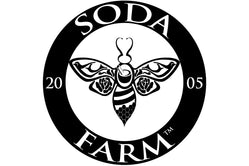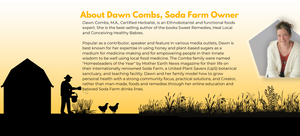5 Reasons You Should NEVER Cook with Raw Honey [Updated for 2024]
While you may understand that raw honey is best, you might now be wondering if you should be cooking or baking with it in your healthy, sugar alternative recipes. Is there truth to the heated honey toxic myth, can you microwave or boil your honey until it becomes poisonous, or is Ayurveda correct and you’ve merely cooked your way to toxicity?
Many people understand that raw honey is best. The problem is that prevailing honey wisdom is to take that raw honey home and COOK with it!! We have a lot of misinformation about honey, and it starts with the idea that it is a healthier alternative to granulated sugar.
You may have been using honey in your baking for some time now. I have some good news and some bad news, and you might want to sit down before you read any further.
What Happens if You Cook Honey?
- Decreased antioxidants, vitamins, and minerals
- Destruction of probiotics
- Loss of flavor
- Glycemic Index Increase
- Toxicity, increased risk of degenerative disease
Almost all of our products use raw honey as an ingredient. The quality of the honey, and the health of the bee, have always been key to our practices. In this article, we are going to detail exactly why you should never eat, cook with or bake with honey. We will show you why it is so important to us that our processes in delivering our products to our customer never damage the honey on which we rely.

Does Cooked Honey Become Toxic?
Honey should NEVER be heated, let alone cooked and eaten. It is not only “just not as good as raw” because of what it loses, it is actually quite unhealthy because of how it begins to alter.
When I began to write about the idea that raw honey is better for you for Sweet Remedies: Healing Herbal Honeys I already knew that centuries of cultural wisdom suggested that honey should not be heated. The historical wasn't enough, I wanted to know the science as well. What I found seems to point to a heat-formed contaminant called 5-hydroxymethylfurfural (HMF).
The true question comes down to what is meant by “toxin” or “poison”. Will eating heated honey cause you to immediately sicken and die. No. It is obviously not a poison on the level of eating a spoonful of strychnine. What we are talking about here is a toxicity that creates imbalance and inflammation in the body. Perhaps if you eat a bit of heated honey once or twice in your life you will never see a negative effect. Our bodies are capable of withstanding a lot of abuse. The problem is in the repeated exposure to a toxic substance that may not only be found in heated honey.
What Happens If You Eat Cooked Honey
The heating process changes the structure of the honey, making it more glue-like. The experience of eating cooked honey to me is almost an immediate need to clear my throat of mucus, like there is irritation and almost a burning happening. The clearing of the throat is exactly what is needed when your body starts to make mucus to protect sensitive skin in your digestive tract. This systemic inflammation, over time can contribute to conditions like congestion, diabetes, obesity, digestive disorders, respiratory illnesses and arthritis.
Is Raw Honey Better for You Than Cooked Honey?
Yes, in fact it has been shown that that antioxidant levels in honey can be reduced by up to 1/3 when it is heated. It is well known that you lose living enzymes (read probiotics) as well, which reduces the benefits that honey naturally has for your digestion. Finally, while nutrient levels fluctuate depending on the part of the world in which the bees collect and the flowers available to them, heating honey is known to reduce vitamin and mineral content.
Does Cooked Honey Taste Different Than Raw Honey?
Good honey has nuance. You should be able to taste a variety of flavors and notes in raw honey. Unfortunately, when it is cooked, honey becomes one-note. It simply becomes overly sweet and cloying- a classic reason why so many people think they hate honey… they’ve only tasted the pasteurized gunk.
Can Diabetics Use Honey in Cooking?
The suggestion that diabetics should avoid cane sugar and substitute honey in their baking is a bad one. There is good evidence to suggest that when honey is cooked, it increases the glycemic index… leaving it not much different than just using sugar. The sad thing here is that raw honey is actually a low glycemic index food… and heating it not only does nothing for blood sugar, it can increase the inflammation that further aggravates a condition like diabetes.

Heated Honey Science
HMF is a known carcinogen and it is highly toxic to bees. We don't really understand just how much of the stuff the human body can consume safely. Unfortunately, it forms any time we heat fructose (so, yeah... this is in quite a lot of things). Just like any other natural substance that "can" become toxic for us, the poison is really in the dose. When we put allll the things we tend to eat with heated fructose together with what we know about honey, it seems warranted to avoid heating this particular food item.
Further, it seems as though the concentration of fructose in the substance heated matters- and high fructose corn syrup and honey are particularly concerning. There are many more questions to answer here. For now, it feels as though the prohibitions in traditional knowledge against eating heated honey are supported by science.
Is It Bad to Put Honey in Hot Drinks?
Raw honey is universally seen as safe to use in hot drinks. Evidence suggests that if you keep it below 104°F (60°C) you are generally ok. In practical terms this means that if your drink won't scald your tongue, it's safe to add honey.
How Do You Decrystallize Honey?
(Excerpted from my book, Sweet Remedies: Healing Herbal Honeys)
"If I can’t heat my honey, what do I do if one of your honey latte blends solidifies?"
If you’ve got a jar of crystallized (thickened) honey, here are some tricks you can do at home:
Try This:
- Fill a pot with enough water to reach just below the opening of your honey jar (remove the jar)
- Warm the pot of water on the stove (do not boil!)
- Remove the pot from the heat source
- Sit your jar of honey in the warm water and leave until the water cools
- Repeat the process as many times as it takes for your honey to slowly turn to liquid
Try This:
Put your honey on the kitchen counter while you’re baking and let the heat of the oven warm up the room and melt your honey.
Try This:
We like to say that crystallized honey has “lost its sunshine.” Put your honey on a windowsill during the summer, and let the sun put some light back into yours.
If All Else Fails:
You might get a little crazy and simply eat it in its crystallized form!
A Few DON’T’S
- NEVER microwave it!
- Don’t superheat your jar.
- Don’t heat your honey in a plastic container
- Don’t “cook” your honey by pouring it into a pan to heat it.

Why Do Beekeepers Heat Honey
Obviously not all beekeepers heat honey, because so many sell “raw” honey… right? Actually, there is a lot of room for interpretation here.
- When honey is harvested it must be "uncapped", this means that the wax caps must be removed from each individual hexagonal cell. Some beekeepers use a heated knife to do the cutting and you will have to decide if you are concerned about the chance of super heating each small amount of honey. We have always used an unheated knife to prevent this problem.
- Honey crystallizes after a time. At home you can safely re-liquify it as I detailed above. In a beekeeping operation it is common to use a bucket or barrel heater. This is a thin strip like a belt that is placed around the center of a large container. It produces high temperatures in one spot and the honey warms out from the center. You end up with super-heated honey. We have always heated the room around our honey and allowed large containers to re-liquify by radiant heat. This is costly and inefficient- so not popular with large beekeepers- but it's worth it to us to ensure healthy honey for our customer.
Keeping honey raw is not only the beekeeper's responsibility, of course. If you buy raw honey because you know pasteurized honey is bad for you and then bring it home to bake into a loaf of fresh bread, guess what you've just made? Yep, you guessed it...when you cook honey you pasteurize it!
I'll let you think about that for a moment.
Does Honey Need to Be Pasteurized?
Honey is actually incredibly shelf-stable for basically, forever. The worst you’ll get over time is crystallization, and that doesn’t mean it’s bad to eat! Pastuerization of honey is not done for any food safety reasons, it’s all happened because of a concern for what the American consumer will buy at the grocery store.
Here’s why honey gets pasteurized:
- It’s done to attempt to extend shelf life. This is sort of ridiculous, because archaeologists have pulled edible honey out of the pyramids… I don’t think we need to worry about shelf life!
- It discourages crystallization. This is true, but not for obvious reasons. Crystallization happens because there are minute particles in suspension in raw honey. It is nearly impossible to remove these… unless… you super-heat the honey so it can go through an ultra-fine strainer. Pasteurization makes this process easy and there is less chance that the honey at the grocery will ever crystallize.
- The American honey consumer has been taught to seek out crystal clear honey when shopping. Many beekeepers have adopted a practice of heating the honey before they filter it. Filtering is important because it takes out any wax chunks after harvesting, but to get anything smaller than the eye can see, you must heat it. We have always used a simple stainless steel strainer and unheated honey passes through it easily. To get honey through the very fine strainers needed to produce crystal clear honey (honey without small bits of pollen, wax and propolis) you must heat it. This is where some beekeepers call their honey “unpasteurized” because they heated it up, but just under 145 degrees. So it’s technically not pasteurized but…..
- Pasteurization is still a popular process for many honey producers. You aren't as likely to find it at the farmer's market, but you certainly will at the grocery store.
- You have to know where your line is. If you are comfortable with your honey being heated to temperatures just under pasteurization you can buy any raw honey. If you would like to be a bit more specific you will need to understand what your beekeeper's practices are before you buy.

![Never Cook Raw Honey [Updated for 2024]](http://sodafarm.com/cdn/shop/articles/Blog_Articles_SF_Membership_Thumbnail_Images_88.png?v=1705446495&width=300)
